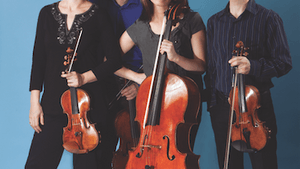Stay in the Loop
BSR publishes on a weekly schedule, with an email newsletter every Wednesday and Thursday morning. There’s no paywall, and subscribing is always free.
Pain without complaint
PCMS presents the Brentano Quartet and Jonathan Biss

The Chamber Music Society of New York has pioneered an idea that is becoming increasingly popular on the chamber-music circuit: the mixed recital, in which artists perform in different genres. Now the Philadelphia Chamber Music Society is dipping its toe in these waters, as evidenced by the Brentano Quartet’s recital with Jonathan Biss. The quartet performed two works alone, and there were two solo performances by Biss.
The concert was also the beginning of a three-part series featuring late works by the composers represented: in this case, Bach’s valedictory Art of the Fugue, a half-dozen brief sketches by György Kurtág from his long-running piano series Játekók (Games), Benjamin Britten’s Third Quartet, and Beethoven’s last piano sonata, the Op. 111.
Passing torches
The Art of the Fugue was Bach’s last work, and the last sketches for it, as the pre-program commentary pointed out, show faltering handwriting, though not faltering inspiration. Bach didn’t prescribe its instrumentation, and although it’s usually played on the keyboard, Brentano performed four excerpts from it to open the concert. They were, as always, skilful and sensitive, but the keyboard’s still a better choice. They did, however, set an introspective mood.
György Kurtág, who turns 91 this month, is still with us, and his Games, a long-running series of brief piano pieces in the manner of Bartók’s Mikrokosmos that has spanned the latter half of his career, was represented by works from 2003. They’re spare in tone though variegated in style, and Biss played them with authority, though with an odd mannerism: Discarding each sheet of music on the floor as he ended a piece. There was a little more “drama” as the Brentano sat in half-light while he played, then immediately began the Britten Quartet as Biss tiptoed offstage. Passing the torch, or just saving time? The Britten, for what it’s worth, is actually the earlier work—1975—and Britten himself was the younger man, so perhaps the torch was going backward?
The Britten was the longest piece on the program, and the most searchingly played. It is an elliptical work, with brief, intertwining motifs rather than the clearly articulated themes we associate with most of his work. It does have the feel of leave-taking, particularly in the final movement, in which a world of pain is expressed without a whisper of complaint. Britten was ailing when he wrote the work, and his good friend Dmitri Shostakovich, who put many of his own final thoughts into the quartet medium, had just passed away. Might we regard this work as a joint requiem? But reticence is a profound characteristic of Britten’s music, and there is an inwardness here that defies parsing; its mystery is its own.
Achieving balance
Beethoven’s 32nd Sonata was far from the end of the line for him, even if it was the last of his sonatas: he still had ahead his five quartets , the Missa Solemnis, the Ninth Symphony, and his crowning keyboard masterwork, the Diabelli Variations. Still, there’s an “incompleteness” that does have a feel of finality about it, since it is, very unconventionally, a two-movement work that concludes with a long Arietta. It shows Beethoven probing the variation form as never before and leaving his composition at that. There’s no sense of breaking off, though, and the work achieves perfect rightness and balance.
As a performer, Jonathan Biss has technique to burn, and his interpretation will no doubt deepen with time; there was a certain showiness, even jazz-inflected at one point, that occasionally did not comport well with the depth of the music. Beethoven is not about reverence, and that’s not the attitude one should take with him. He demands virtuosity, too, but not of a kind that calls attention to itself. Biss sat over the keyboard without moving for a long, Lang-Langish moment after the final notes, as if moved in equal measure by the music and his own performance of it. The latter was more properly the audience’s to judge.
What, When, Where
The Brentano Quartet and pianist Jonathan Biss, in recital. Philadelphia Chamber Music Society. Johann Sebastian Bach, The Art of the Fugue; Selections; György Kurtág, Játekók (Games), Vol. VII; Benjamin Britten, String Quartet No. 3, Op. 94; Ludwig van Beethoven, Piano Sonata No. 32 in C Minor, Op. 111. February 16, 2017, at the Kimmel Center's Perelman Theater, 300 S. Broad Street, Philadelphia. (215) 569-8080 or pcmsconcerts.org.
Sign up for our newsletter
All of the week's new articles, all in one place. Sign up for the free weekly BSR newsletters, and don't miss a conversation.

 Robert Zaller
Robert Zaller